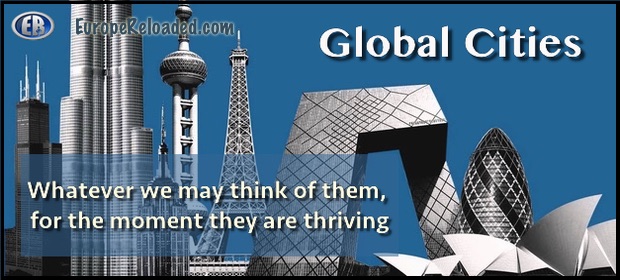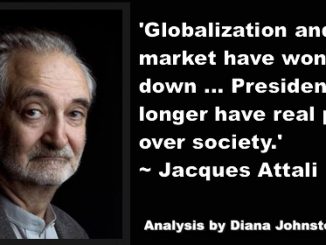
Our Thriving Global Cities
GUILLAUME DUROCHER
We should not underestimate the power and logic of globalism.
The fact is that, while Western nationalists lament diversity, the West’s wealthiest places are extraordinarily diverse and are growing richer: I am talking about our so-called ‘global cities’. These include such places as New York City, London, Paris, and, beyond the West, Singapore or Dubai. In some sense, we might consider the greater Bay Area in California surrounding Silicon Valley to be a kind of global city. We should try to understand the prosperity of these places and their future prospects.
Western nationalists associate ‘diversity’ with black and brown people with low average IQs and comparatively high welfare use and criminality. Western globalists, however – who form a solid 20% of the white population, often the most educated and intelligent portion – associate diversity with the ‘global cities’ they live in, which are perfectly functional from an economic point of view, and that is typically enough for them. For a nationalist, ‘diversity’ might conjure up grisly images of the victims of Islamic terrorism or the treasonous mass sexual abuse by Pakistani gangs against English girls. But for a globalist, ‘diversity’ means the kebab shop down the corner, a kindly Mexican nanny, or the competent Asian guys at the office. And they can only think: Why are you being such a hater?
Global cities are typically ‘majority-minority,’ no ethnic or racial group being a majority on their own. In Paris or London, it is true, the prevalence of European migrants means that whites form a small majority, but the native British or French whites certainly form a minority.
The Île-de-France region of France has a GDP per capita 177% the EU average, for London the figure is 187%. Unemployment in such regions is typically low. Their achievement is all the more remarkable in that these regions typically have seen a growing population over the years. Note: I am not justifying global cities. I am merely observing that their ability to provide jobs and social services for their highly diverse populations is high . . . and getting higher.
Why do global cities work? The explanation I find most persuasive is that of cognitive elitism. Cities are where people get together and connect, then being able to exchange, collaborate, and specialize, thus producing wealth and innovate, in a way which would be quite impossible for individuals isolated across various villages. In a modern economy, this means intelligent people gathering in innovative, wealth-creating, and/or wealth-siphoning institutions, such as the great tech and financial services companies, or really all the multinationals whose products and services we take for granted. I for one do not dismiss the accomplishments of Google, Carrefour, and IKEA.
Within the United States of America, to simplify somewhat, educated people are leaving the often Trump-voting heartlands in favor of the West Coast (especially California), Texas, and the Northeast.[1] In Europe, the southern and eastern periphery of the European Union is being strip-mined of its human capital, Portuguese nurses and Romanian doctors preferring to move en masse to secure the better wages and public services of northwestern Europe (they move, it is true, not necessarily to the big cities, but often to more suburban settings).

Tim Ball and Ginger Hervey/POLITICO
A stark fact is that global cities seem to be getting more rather than less viable as they get more diverse. After a sharp rise in criminality in the final Obama years – partly it seems due to a loss of nerve on the part of the president, who preferred to scapegoat law enforcement officers rather than face the reality of black crime – homicide has been steadily declining over the past two years, perhaps not coincidentally, since President Donald Trump has been in office. New York City’s murder rate has been steadily declining, partly thanks to Mayor Michael Bloomberg’s stop-and-frisk policies targeting black and Mestizo young men.
A point I want to make: global cities’ diversity challenges can, in large part, be managed through a regular dose of liberal hypocrisy/cognitive dissonance. New Yorkers instituting racial profiling in their police force to keep themselves safe is only one example. Another is the wider phenomenon of gentrification, whereby the more problematic minority groups can simply be priced out of wherever affluent liberals live (typically imposing said problematic minorities onto neighboring white middle or working class towns).
Another solution is racial self-segregation, a very popular practice in all global cities, particularly among white liberals. You can find innumerable maps documenting residential self-segregation: whether in the United States (notably New York and Los Angeles), London (where, interestingly, white European immigrants seem to mostly settle in white British neighborhoods), or Brussels (where European and Muslim immigrants typically settle in separate neighborhoods).
In general, the authoritarian state’s ability to manage diversity has still only been partially implemented. Mass surveillance, gun control, censorship, and welfare can do further wonders in domesticating mankind and making us almost completely docile. European blacks, while not particularly academically or socially successful, are typically much more docile the American blacks, I believe because of a lack of guns, ample welfare, and, perhaps, survival of traditional African culture (is there any data comparing crime by Caribbean vs. African blacks?). In another genre, Singapore and the United Arab Emirates, as authoritarian states, can manage their diversity problems very well.
In the global cities, whatever negative economic effects there are to unskilled immigration appear to be more than offset by the benefits of gifted immigration.
Beyond brains, global cities attract money, namely, Third-World money. All the wealthy people in the world – from Latin America through Africa, the former Soviet space, and much of Asia – wish for themselves and their children to enjoy an economic, personal, and legal security which can only be found in the Western world, with our attachment to fair play and the rule of law.[2] Various nouveaux-riches from China, India, Russia, the Gulf states, and elsewhere are then buying up property, media, and football clubs in the West and sending their children to our universities. This is driving up property prices and, hence, contributing to the poor-minority-removing gentrification mentioned above. The owners of Third-World money are typically not stupid but are often vicious and corrupt.
The process of modernity, an exceptional development in world history, was launched by the Western world. Capitalism and industrial development were perfected by the Protestant countries – the United States, Great Britain, Germany – and then more-or-less successfully copied elsewhere, notably in the rest of Europe and in East Asia. However, innovation and science today, modernity’s ongoing dynamic development, have to some extent transcended Western nations as such. There is a real sense in which New York and California are not America anymore, Paris is not France, London is not England.
In short, Western economic and technological dynamism is no longer an endogenous national process – consolidation of national identity, mass literacy, urbanization, each of which maximized the nation’s developmental potential. Modernity has since truly taken on a life of its own, no longer being executed by Western nations, but happening to Western nations.
The global cities represent a global phenomenon which has, for various historical reasons, nested within Western nations: the convergence of intelligences from across the entire world and the convergence of moneyed interest from the entire world. These are in a process of symbiosis and partial fusion with the West’s own liberal-capitalist elites. Western nations’ elites, their brains, have gone from being patriotic elites with a strong sense of national purpose, to deracinated white liberals with no particular attachment in a coalition with other groups, namely Jews and various minority groups, rich or poor. To get a sense of this new elite, consider the very useful Forbes lists of billionaires for various countries, a diverse lot (disproportionately Jewish, wherever this group is present).
The deracinated white liberal metropolitan is a strange breed, at once privileged and, often, a non-citizen with no say in his adoptive nation’s politics. Cut off from the mentality and rhythm of his nation of residence, he may be possessed by various degrees of incomprehension, fear, and loathing for the wider population, who may vote for pseudo-nationalists, because, being normal human beings, they like the idea of having politicians who at least pretend to be on their side and to preserve their homeland.
The fact that global cities, and the Western nations in general, are continuing to grow economically and attract brains suggests that the logic of the process has not yet finished. There is still more ‘efficiency’ to be wrung out of the system.
This isn’t to say I think this process is sustainable, let alone good. However, I suspect it can go on for a long while still. We should not underestimate this, nor the appeal that ‘high-globalism’ has – the globalism of big business, of science, of technological innovation, of social transformation – on a significant fraction of the most active and dynamic Westerners. If Western societies were under severe strain – a great war, economic collapse, or environmental breakdown – whites may wish they lived among their own kind in the suburbs or the countryside rather than the global cities. The violent race riots which strike American, British, and French cities every decade or so are a testament to this. But, while we may have reason to hope for collapse, we need to patiently work in the knowledge that collapse is unlikely anytime soon.
************
Original article
Notes
[1] This data also indicates that smart people are leaving New York State however. I have no insight into this. Are people leaving to avoid prohibitively high living costs?
[2] Actually, they would be even safer in Japan, but the Japanese have largely restricted immigration up to now, wishing to preserve their national identity.

••••
The Liberty Beacon Project is now expanding at a near exponential rate, and for this we are grateful and excited! But we must also be practical. For 7 years we have not asked for any donations, and have built this project with our own funds as we grew. We are now experiencing ever increasing growing pains due to the large number of websites and projects we represent. So we have just installed donation buttons on our websites and ask that you consider this when you visit them. Nothing is too small. We thank you for all your support and your considerations … (TLB)
••••
Comment Policy: As a privately owned web site, we reserve the right to remove comments that contain spam, advertising, vulgarity, threats of violence, racism, or personal/abusive attacks on other users. This also applies to trolling, the use of more than one alias, or just intentional mischief. Enforcement of this policy is at the discretion of this websites administrators. Repeat offenders may be blocked or permanently banned without prior warning.
••••
Disclaimer: TLB websites contain copyrighted material the use of which has not always been specifically authorized by the copyright owner. We are making such material available to our readers under the provisions of “fair use” in an effort to advance a better understanding of political, health, economic and social issues. The material on this site is distributed without profit to those who have expressed a prior interest in receiving it for research and educational purposes. If you wish to use copyrighted material for purposes other than “fair use” you must request permission from the copyright owner.
••••
Disclaimer: The information and opinions shared are for informational purposes only including, but not limited to, text, graphics, images and other material are not intended as medical advice or instruction. Nothing mentioned is intended to be a substitute for professional medical advice, diagnosis or treatment.




